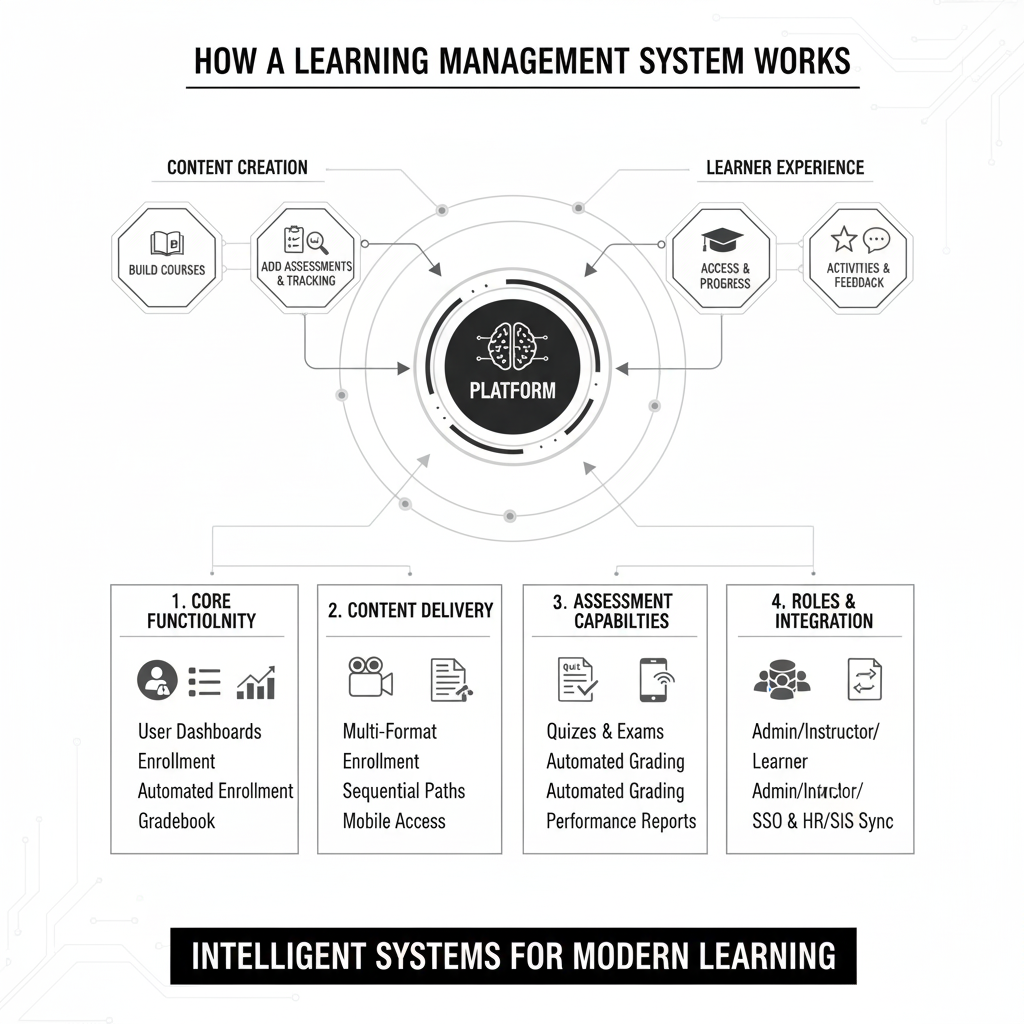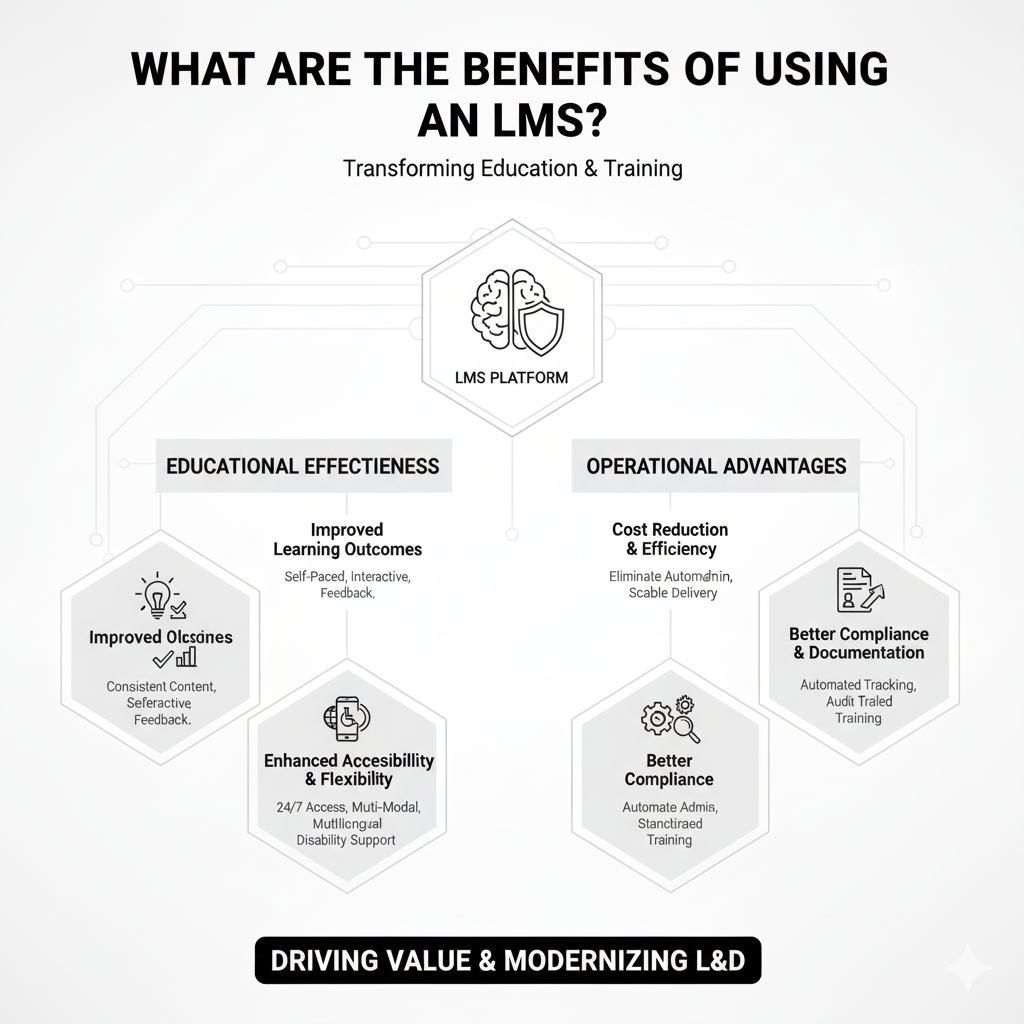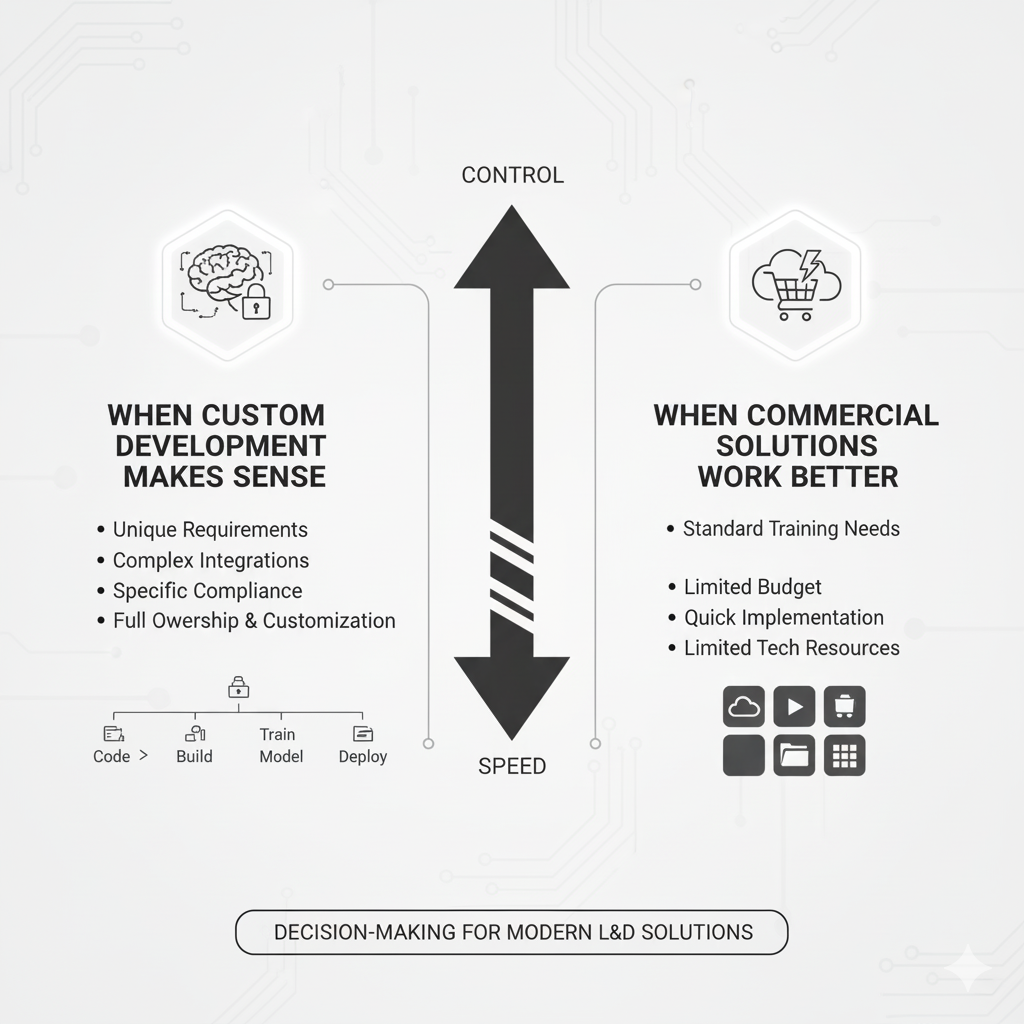
If you've ever taken an online course or completed workplace training modules, you've probably used a learning management system without knowing it. These platforms have quietly become the backbone of modern education and training.
While everyone's using LMS software, most people don't really understand what it is or how it works. Whether you're running a business that needs employee training, managing a school district, or just curious about the technology powering online education, understanding learning management systems can help you make better decisions.

The right learning management system can transform how people learn and grow, but the wrong choice can waste time, money, and frustrate everyone involved.
So let's walk through everything you need to know about learning management systems. We'll cover what they are, how they work, what types exist, and how to think about whether you need one.
Why Do Organizations Need LMS?
A learning management system, or LMS, is software that helps organizations create, deliver, track, and manage educational content and training programs. The thick of it is the digital infrastructure that makes organized learning possible.
Learning Management System Definition and Core Purpose
At its heart, an LMS platform serves as a central hub where all learning activities happen. Instead of having training materials scattered across emails, shared drives, and physical handouts, everything lives in one organized place.
Students or employees can access courses, complete assignments, take tests, and track their progress all from the same system.
The learning management system handles the administrative side too. It tracks who's completed what training, generates reports for compliance purposes, and gives instructors visibility into how learners are progressing. This automation saves countless hours of manual tracking and paperwork.
LMS software has become essential because learning has become more complex and distributed.
Organizations need to train people across different locations, time zones, and schedules while ensuring everyone receives consistent information.
How Does a Learning Management System Work?
Learning management systems work by organizing educational content into structured courses. Content creators use the LMS platform to build courses by uploading material like videos, documents, and interactive elements.
They organize content into logical sequences, add assessments, and set up a tracking mechanism.

Core LMS Functionality
Learners access the LMS software through web browsers or mobile apps. They see assigned courses, track progress through visual indicators, complete activities and assessments, and receive feedback on performance. The interface includes dashboards showing what needs completion and overall progress.
The learning management system handles user enrolment automatically or through administrator control. When someone joins an organization or needs specific training, they can be automatically enrolled in relevant courses with notifications about assignments and deadlines.
Assessment capabilities allow course creators to build quizzes, exams, and assignments directly into the learning experience. The LMS platform can automatically grade certain question types, provide immediate feedback, and record scores for reporting.
Content Delivery and Management
LMS software supports multiple content formats, including videos, documents, presentations, and interactive elements. Sequential learning paths guide students through the curriculum in logical order, with the learning management system enforcing prerequisites to ensure knowledge builds properly.
Mobile accessibility means learners can access content from smartphones, tablets, or any device with internet access. Modern LMS platforms provide responsive designs that work on different screen sizes and often include offline capabilities.
User Roles and System Integration
Learning management systems include multiple user roles with different permissions. Administrator controls provide system-wide management, instructor capabilities focus on course creation and learner interaction, and learner interfaces provide course access and progress tracking.
Modern LMS platforms integrate with other organizational systems through single sign-on (SSO), student information systems, and human resources databases. These integrations eliminate duplicate data entry and provide seamless user experiences.
Looking for the Right LMS for Your Team?
Let's talk about what you need and find the best fit for your training goals.

What Are the Top 6 LMS Platforms in 2025?
When you're exploring LMS software options, it helps to understand what the leading platforms actually offer.
These six LMS platforms represent different approaches to learning management and serve various organizational needs, from small businesses to large enterprises.
1. Moodle
Moodle operates differently from other LMS platforms because it's open-source, meaning there are no licensing fees and unlimited customization possibilities.

This learning management system powers educational environments worldwide, from small community colleges to massive university systems.
What makes Moodle appealing is its massive global community of developers and educators who continuously improve the platform.
If you have specific requirements that commercial LMS software can't meet, Moodle's open architecture means you can build exactly what you need.
Many organizations appreciate having complete control over their learning management system without being locked into vendor upgrade cycles.
2. 360 Learning
360Learning flips the traditional LMS software model on its head by focusing on collaborative learning rather than top-down training delivery.

Instead of just consuming pre-made courses, users actively contribute knowledge and create learning experiences together.
The collaborative approach makes sense if your organization has internal experts who could teach others but don't have instructional design experience. 360Learning provides tools that make it easy for subject matter experts to share knowledge without needing to become professional course creators.
3. Blackboard
Blackboard has been a cornerstone of higher education LMS platforms for decades, and many universities still rely on it for good reasons.

This learning management system integrates deeply with academic systems like student information databases, gradebooks, and campus directories.
What makes Blackboard stand out is its understanding of academic workflows, such as managing semester transitions, handling prerequisites, and supporting different grading schemes that vary by department.
4. Skilljar
Skilljar takes a unique approach by specializing exclusively in customer training and partner education.

Unlike general-purpose LMS platforms, this learning management system is designed specifically for companies that need to educate people outside their organization.
The platform excels at creating branded learning experiences that feel like natural extensions of your product rather than generic training modules. Skilljar's strength lies in measuring how training impacts business metrics, such as product adoption, customer satisfaction, and support ticket reduction, connections that traditional LMS software often struggles to make.
5. Docebo
Docebo has built a reputation as a robust enterprise LMS software solution that leverages artificial intelligence to make learning more effective.

What sets this LMS platform apart is its ability to automatically recommend learning paths based on user behavior and skills gaps.
If you're managing a large organization with diverse learning needs, Docebo's multi-audience approach means you won't need separate learning management systems for different groups.
The platform's AI capabilities can predict what training someone needs before they even realize it themselves, which is pretty impressive for keeping teams ahead of industry changes.
6. Litmos
Litmos positions itself as the straightforward choice for corporate training, emphasizing quick setup and ease of use over advanced features.

This LMS platform appeals to organizations that want to get training programs running fast without extensive technical setup or user training.
The strength of Litmos lies in its simplicity and reliability for common use cases. While it might not have all the bells and whistles of more complex LMS software, sometimes straightforward functionality is exactly what busy training managers need to get results without complications.
What Are the Benefits of Using an LMS?
Learning management systems provide concrete benefits that often justify the investment and transform how organizations approach education and training.

Educational Effectiveness Benefits
Improved learning outcomes result from consistent content delivery, self-paced learning that accommodates different speeds, interactive content that increases engagement, and immediate feedback that reinforces understanding.
Enhanced Accessibility and Flexibility provide 24/7 access to materials, multiple learning modalities for different preferences, multilingual support for diverse populations, and accessibility features for learners with disabilities.
Operational Advantages
Cost Reduction and Efficiency eliminate travel and venue costs, automate administrative tasks, and enable scalable delivery to unlimited learners simultaneously without proportional cost increases.
Better Compliance and Documentation provides automated tracking for regulatory requirements, comprehensive audit trails, and standardized training delivery that ensures consistency across the organization.
Confused About Which LMS Platform to Choose?
We'll help you compare options and pick what actually works for your organization.

How to Choose the Right LMS for Your Organization
Selecting appropriate LMS software requires a systematic evaluation of your needs, available options, and organizational capabilities.
Selection Framework
Organizational Needs Assessment should define specific learning objectives, identify technical requirements, including integrations and security needs, assess user base size and growth projections, and evaluate budget constraints.
Feature Requirements Analysis should distinguish essential features that must be included from nice-to-have capabilities, identify any custom requirements, and understand integration needs with existing systems.
Evaluation Criteria
Platform Assessment should evaluate user interface design, performance and scalability, security and compliance capabilities, and mobile accessibility across devices.
Vendor Evaluation should consider company stability, customer support quality, implementation services availability, and pricing transparency with clear contract terms.
Custom LMS Development vs Buying Software
The choice between custom development and commercial LMS software depends on your specific requirements, resources, and strategic objectives.

When Custom Development Makes Sense
Custom learning management system development is appropriate when you have unique requirements that commercial solutions don't address, complex integration needs, specific compliance requirements, or long-term strategic needs for complete ownership and unlimited customization.
When Commercial Solutions Work Better
Commercial LMS platforms are appropriate for standard training needs, limited budgets, quick implementation requirements, and organizations with limited technical resources for custom platform management.
Why Third Rock Techkno Focuses on Educational Technology Solutions
Our approach to learning management system development emphasizes understanding your specific educational requirements before recommending technology solutions. We help organizations evaluate both commercial and custom options objectively.
Our Educational Technology Expertise
We provide comprehensive services from requirements analysis through platform evaluation, custom development when needed, and ongoing support. Our experience includes both LMS software evaluation and custom learning management system development for organizations with unique requirements.
When custom development makes sense, we provide end-to-end services including technical architecture, development, and long-term platform evolution support.
Ready to Build Your Own Custom LMS?
Let's discuss your training needs and create something that works exactly how you want.

Conclusion
Learning management systems have become an essential infrastructure for modern education and training programs. Understanding LMS software options helps you make informed decisions about your organization's learning strategy.
The variety of LMS platforms available means there's likely a solution fitting your needs and budget. Commercial solutions offer proven functionality and quick implementation, while custom development provides unlimited flexibility and ownership advantages.
Your learning management system choice will impact your organization's ability to deliver effective training for years to come. Invest time in understanding your options and choosing the approach that aligns with your goals and constraints.
Ready to explore LMS platforms for your organization? Start by clearly defining your learning objectives, user requirements, and success metrics. From there, you can evaluate which approach provides the best foundation for your educational and training programs. Contact us today!
FAQs
What's the difference between an LMS and other educational technology?
A learning management system is specifically designed to deliver, track, and manage formal learning programs with features like gradebooks, course progression, assessments, and learning analytics. Unlike general collaboration or content management tools, LMS platforms are purpose-built for structured learning.
How long does LMS implementation take?
Commercial LMS software typically takes 1-3 months, including configuration and training. Custom learning management system development usually requires 6-18 months, depending on complexity and integration requirements.
Can an LMS integrate with existing systems?
Most modern LMS platforms support integration with student information systems, HR databases, and authentication systems. Integration complexity varies, so validate requirements during the selection process..
What technical expertise do we need?
Commercial LMS software requires minimal technical expertise for daily management. Custom learning management systems may need more technical resources or ongoing support partnerships.
How do we measure LMS success?
Measure learning management system success against original objectives using metrics like completion rates, learner satisfaction, knowledge retention, and business impact. Calculate ROI by comparing costs against benefits like reduced travel expenses and improved productivity.

